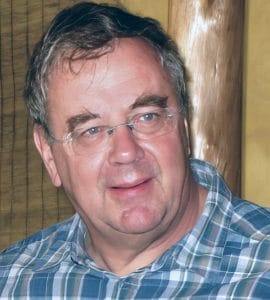Born in the U.K. to be an editor of dictionaries (or, as he himself put it, he was “a lexicographer, corpus linguist, and onomastician”), Hanks was barely out of University College, Oxford, when he was hired as the editor of the Hamlyn Encyclopedic World Dictionary. Before that even came off the presses in 1971, he was named editor of the Collins English Dictionary, published in 1979, and was named as the Director of the Names Research Unit at the University of Essex, where he also began his Ph.D, which he finished at Masaryk University in the Czech Republic.

OK, but what did he do, other than edit dictionaries? Plenty! He developed a method of “corpus pattern analysis” of English, which involves “re-evaluating numerous basic assumptions in linguistics; I have found it necessary to develop a new, empirically well-founded theory of meaning in language” — right down to the very nature of linguistic creativity. He also spent a lot of time researching the origins of both given names and surnames, both in the United Kingdom and the United States. For instance, he found that many common surnames actually started as slurs of one sort or another.
Those descended from orphans, for instance, might have surnames like Jette (French: “thrown out”), Esposito (Italian: “exposed”), or Parrish (English: raised by a church or community). (Most families with the name Bastard, he said, have changed it by now.) People named Nott or Cave probably were bald. In German, you might find Armann (“poor man”), Scheunpflug (“avoids the plow”), or Schiller (“cross-eyed”). And what of perhaps the most famous English surname of all? “Shakespeare is probably an obscene name, originally,” Hanks said, “for a masturbator.” He was editor-in-chief of the Oxford Dictionary of Family Names in Britain and Ireland (2017), which is so huge it retails on Amazon * for $600.
Another of Hanks’ favorite topics is perhaps even more amusing: he was working on a new book of grammar for English based on his Corpus Pattern Analysis method which, he said, “will help to dispel at least two ancient misleading and misguided assumptions: 1) that logic underlies natural language, and 2) that modern languages such as English are really Latin in disguise.” (As far as I can tell, that one isn’t published yet.) He was also the managing editor of the Collins Birmingham University International Language Database, COBUILD, which created a corpus of contemporary electronic text. With 4.5+ billion words, COBUILD is so vast, the “Bank of English” is a subset of its work.
Hanks also worked as a visiting scientist at the Linguistics Research Department of AT&T’s Bell Labs in New Jersey, where he worked on methods to help computers better understand natural language, and along the way he served as a visiting professor at various universities to teach his theories and methods. And, of course, kept editing dictionaries. “He was perhaps the most entertaining speaker in our field,” said University of Portsmouth linguist John Williams, “with the knowledge to back it up.” Patrick Wyndham Hanks died on February 1 from Covid-19. He was 83.
